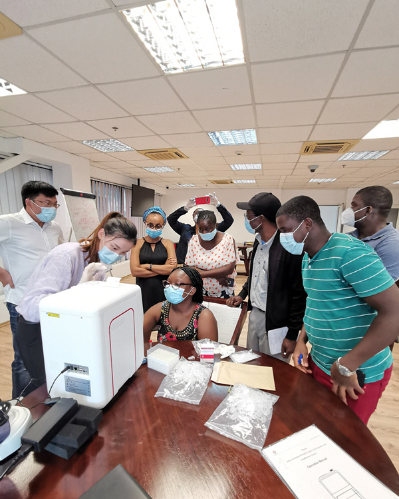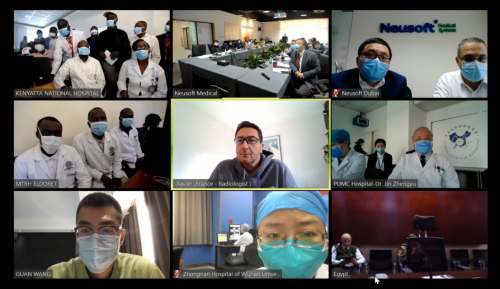|
||||||||||
| Home Nation World Business Opinion Lifestyle ChinAfrica Multimedia Columnists Documents Special Reports |
|
||||||||||
| Home Nation World Business Opinion Lifestyle ChinAfrica Multimedia Columnists Documents Special Reports |
| ChinAfrica |
| Chinese sci-tech companies cooperate closely with African countries in their fight against COVID-19 |
| By Ge Lijun VOL.12 July ·2020-07-20 |

For some time now, Gregory Rockson, co-founder and CEO of mPharma, a Ghanaian healthcare startup, has had only one idea in mind: finding ways to make more COVID-19 tests for his country.
His company is the largest supplier of medicines in Ghana and operates a network of branches across the country and abroad, including in Nigeria, Zambia and Zimbabwe. Following the recommendation of one of his investors, Breyer Capital, Rockson became interested in the range of products offered by Chinese firm Sansure Biotech. Since the onset of the epidemic, Sansure Biotech has rapidly developed a whole range of virus detection reagents, equipment and POCT devices, which have been exported to more than 110 countries and regions as part of China's anti-pandemic assistance.
As such, cooperation between Sansure Biotech and mPharma is a good example of the broader collaboration taking place between China and Africa in the face of the pandemic. In addition to Sansure Biotech, many other Chinese companies have been engaged in science and technology cooperation with African countries to jointly address the challenges of the ongoing health crisis.
Product-based cooperation
When it became clear that the COVID-19 pandemic was going to have a major impact on the continent, mPharma immediately identified one of the problems that would hinder an effective response on a larger scale in Africa: the lack of screening equipment and detection reagents.
According to CDC Group, a British finance and development institution that funds mPharma, at that time Ghana had only two laboratories able to perform screening tests, Nigeria had six, and Zambia had only one. However, Rockson knew that there were dozens of private medical labs in these countries that could perform tests if they had the necessary equipment and components.
As a result, mPharma partnered with Sansure Biotech to procure screening equipment and detection reagents. It received 400,000 kits and more than 100 devices. After receiving the products, Rockson was faced with a new problem: he had to show his employees and customers how to use them properly and efficiently. Due to the pandemic, international travel was blocked and Sansure Biotech technicians were unable to travel to Ghana to provide on-site training.
"We used the video chat function on WeChat, which is a very convenient feature. That way, we were able to train the staff on how to use the devices," Rockson told Xinhua News Agency.
This way, 26 private medical labs in Ghana and Nigeria received the equipment and supplies needed to do the testing for local people. The company also donated two portable PCR workstation POCT devices to the Ghanaian Government, making it possible to test even more people.
"As soon as the virus appeared in China, our company set up an epidemic prevention and control team of more than 10 people in Wuhan. Over the next two months, we helped Hubei with resolving its bottlenecks of insufficient nucleic acid testing capabilities and low efficiency of early detection. Today, Sansure is active abroad, including in African countries, offering technical support to Ghana, Gabon, Zimbabwe and Sierra Leone in the form of cooperation or donations," Dai Lizhong, President of Sansure Biotech, told ChinAfrica.
According to Rockson, the equipment provided by Sansure Biotech was able to fill a gap in Africa's medical system for the time being, but it will be very important for Africa to establish its own infrastructure system for virus detection in the future. "We are starting to look at cooperation after the COVID-19 pandemic," he said.

Taking advantage of technology
On April 23, a live broadcast event was organized by Chinese company Ant Financial Services of Alibaba Group and the United Nations Economic Commission for Africa on the use of technology to help African countries fight COVID-19. Participants agreed that technology was a common denominator in all efforts to mitigate the impact of the pandemic, restore livelihoods and address similar challenges in the future.
In China, the "One Net Smooth Travel" system, developed by China Electronics Technology Group Corp. (CETC), has proven to be a powerful tool in the fight against the epidemic. It played a major role in getting the epidemic situation under control, limiting the spread of the virus and resuming work and production.
On May 7, the Zambia Science and Innovation Center of CETC organized an event to share China's experience in the field of epidemic prevention. The role played by computerized systems such as "One Net Smooth Travel" took center stage during the discussions. After the event, Amos Malupenga, Permanent Secretary of the Zambian Ministry of Information and Broadcasting Services, said that China's experience in this area was a valuable reference for his country.
Equipped with intelligent imaging and cloud scanning equipment provided by Neusoft Medical, a Chinese provider of clinical diagnostic and treatment solutions, the Kenyatta National Hospital was able to realize the interconnection of digitalized medical data and images at the national level.
Eight new cases of COVID-19 were confirmed in Kenya on March 22. On the same day, Kenyatta National Hospital, in collaboration with its strategic partner Neusoft Medical and medical device supplier Megascope Healthcare Kenya, officially opened the Scanning Center, the National Imaging Center and the Clinical Training Center. At the same time, Neusoft Medical and Megascope unveiled their clinical cooperation program with Kenyatta National Hospital based on artificial intelligence software, laying the cornerstone of a "Health Silk Road" defined by the sharing of advanced medical experiences.
"By sharing experiences on technologies, drugs and treatments, I hope to enable new types of medical operations and deepen cooperation for the benefit of Kenyans and humanity as a whole," said Mutahi Kagwe, Cabinet Secretary of the Kenyan Ministry of Health, after the inauguration ceremony.
Several Chinese companies have provided anti-epidemic technology support to African countries. In early April, Huawei, a Chinese information and communications technology giant, donated videoconferencing equipment and infrared thermometers to the Tanzanian Government. In addition, Huawei has committed to ensuring the stability of the Tanzanian operator's network during the epidemic and to setting up an e-learning platform for students who need to study at home.
Jim Breyer, founder of Breyer Capital, said Chinese technology companies can play an important role in combating COVID-19 and detecting viruses in Africa in the future. "China has not only helped the less developed regions fight the epidemic, and its manufacturing capacity and technical expertise have also prevented the deterioration of the epidemic in Africa," he told China Business Network.
(Printed Eition Title: Tech Firms Tackle Pandemic)
Comments to glj@chinafrica.cn
| About Us | Contact Us | Advertise with Us | Subscribe |
| Copyright Beijing Review All rights reserved 京ICP备08005356号-5 京公网安备110102005860号 |